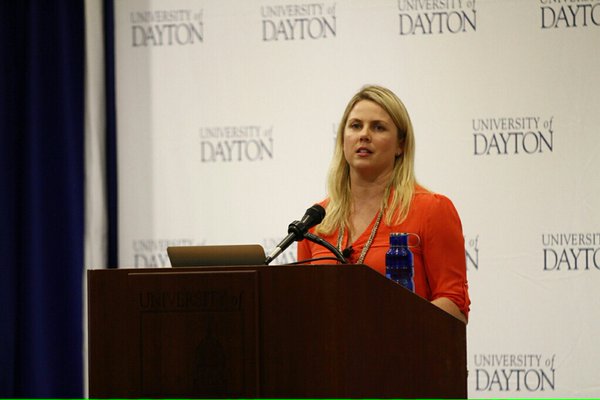Ellen Gustafson: ‘We the Eaters’ at UD can help feed world well
By: Amanda Dee – Online Editor-in-Chief
Ellen Gustafson asked the crowd in KU ballroom, spilling into the hallway and filling another room, to look at their plates and ask themselves if their morals reflected back at them.
“I think the number one thing is if we can redefine what the value meal is and let the meal be the place where our values are expressed…” Gustafson said in an exclusive interview with Flyer News Oct. 21, “whatever our values are—whether it’s to improve the environment by using less chemicals, to improve the waterways and water supply by using and eating foods that don’t require a lot of water, whether it’s food justice by buying from companies that have a food justice element to the business…”
Gustafson, a sustainable food systems activist and the first of four in the UD Speaker Series, presented “A New Understanding of Hunger Obesity and the World System” Tuesday evening, day two of the university’s Sustainability Week.
Before she journeyed into food justice, Gustafson did her undergraduate honors thesis on terrorism. Her senior year, her research became a U.S. reality when two planes crashed into the twin towers, and she continued to do work around this issue at ABC News, until she “did her homework” and learned about a problem that she felt called for her direct and immediate attention.
Food.
Regions of the world stricken by hunger, she explained, are almost always regions torn by war and violence.
“A hungry man is an angry man,” she said, “and I will add on to that that ‘a hungry woman’ is not something I will use on this podium.”
So she made a change, which, she said, is just what a good leader does. She changed careers, first joining the U.N. World Food Program. In her apartment in New York, she started the FEED program, which has provided over 60 million school meals around the world, as cited by her website.
However, she explained in one of her rhyming points (because she remembers hip-hop lyrics better than anything she ever learned in school) “PROCEED,” just feeding wasn’t and isn’t enough.
Her epiphany came in a marketplace in one of Uganda’s largest cities. She went to buy some fruit and could only find “Pringles and soda”—what would be available in the convenience store after she got off her plane in New York. So she started doing more homework, this time, looking even more closely at her own country.
Between 1980 and 2012, the amount of hungry people grew, but the amount of overweight people grew with it. In 2010, she said 1 billion people reported hungry and 1 billion overweight in the U.S. She pulled up a colored map in her presentation indicating weight brackets. By 2013, she said, “We needed a new color scale to show our weight as a country.”
“I believe with every fiber of my being that we can feed the world,” she said. “I think the right question is, ‘Can we feed the world well?’”
After swallowing this, she started researching our agricultural system, in which 1/7 of people are hungry and 1/3 of food is wasted—all along the production line, from farmer to transporter to consumer.
Our food system took a turn in 1980, when U.S. food policy subsidized farmers—only for certain crops. Healthy food prices spiked. Today, Gustafson said, “Wheat, corn, soy and cotton make up 75 percent of the items in the grocery store.”
Gustafson said she isn’t arguing for a return to mom and pop farms or a time when every family grew their own food, but that the system we have is neither a sustainable one nor a cheap one when the costs are building up in our healthcare and other areas of our lives.
Gustafson pointed to the power of UD and its students in solving this issue, since the younger generations are the ones who will have to resolve this global problem or watch it erupt.
“You know, it used to be the old myth of a great university, that it’s a city on the hill and that it’s an ivory tower away from everything else,” Gustafson said in an exclusive interview with Flyer News. “So, not linking the University of Dayton to the city of Dayton would be a loss of potential education on both sides. Because there’s a lot that you’re doing here that’s super progressive and interesting and could be utilized in the city, and there’s a lot that the city’s doing…and not for nothing, but it means that there’s potential opportunity for internships and work and resources to be shared back and forth. I think what I saw last night with a lot of local leaders in the food space coming to this talk, there’s a lot of interest with engaging with the university.”
Some of Gustafson’s good eats:
– Look to other universities in Ohio and around the world for ideas.
– Talk and work with Dining Services.
– Go to farmer’s markets like Second Street Market and support local.
– Buy the healthy food that’s in season to reduce costs—squash in the fall is cheaper; berries in the summer are cheaper.
For more on Ellen Gustafson, her projects or her book, “We the Eaters,” visit her site or follow her on Twitter. For more on UD’s “green initiatives,” visit here. Photo of Gustafson by Multimedia Editor Chris Santucci.

